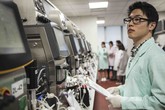Biosimilars/Research
Structure-function relationship between disulfide bonds and TNF-α neutralization in etanercept
Research carried out by Sandoz describes how a novel incorrect disulfide bridge structure present at low levels in commercial etanercept inhibits etanercept potency by reducing its ability to neutralize soluble tumour necrosis factor alpha (TNF-α) [1].
Pharmacy-mediated substitution: the global policy landscape
There is a complex global regulatory landscape when it comes to biosimilars. In particular, there is much debate over substitution practices. Substitution describes the practice where a pharmacist decides to change a product, dispensing an equivalent (generic small molecule) or highly similar product (biosimilar) without the prescribing physician’s prior consent. This is distinct from switching, whereby a physician changes a patient’s treatment, between reference product and a biosimilar, or between biosimilars. Between March and May 2017, Pfizer conducted an internal global survey of 82 countries in which it examined biosimilar pharmacy-mediated substitution. Here, the company hoped to understand and benchmark the global policy landscape [1].
Kissei/JCR’s darbepoetin alfa biosimilar shows equivalent safety and efficacy
Japan-based collaborators Kissei Pharmaceutical (Kissei) and JCR Pharmaceuticals (JCR) announced on 17 January 2018 positive results for the phase III study of their candidate darbepoetin alfa biosimilar, JR‑131.
Strategies of players on the global biopharmaceutical market
With many expensive and high-selling biologicals losing patent protection and other exclusivity rights, biosimilars of these molecules may now enter the market, resulting in a shift of market shares, revision of strategies of companies and attraction of new players to the biopharmaceutical market.
Barriers to the market access of biosimilar monoclonal antibodies
In September 2013, the first biosimilar monoclonal antibody (mAb) was approved by the European Medicines Agency (EMA), i.e. biosimilar infliximab (Inflectra/Remsima). These products entered the European market in 2015, after expiry of patent and other exclusivity rights of the innovator medicine Remicade. With the ever-increasing cost of health care and the economic pressure to reduce or sustain healthcare expenses, biosimilars could be instrumental in reducing cost for medication and increasing patient access to treatment. Although exclusivity rights of multiple mAbs are expired (rituximab in 2013, trastuzumab in 2014), only recently biosimilar mAbs other than infliximab are receiving marketing authorization (rituximab, adalimumab). Furthermore, earlier biosimilars have seen slow uptake in European markets. This may imply that several barriers hinder market access of biosimilar mAbs.
Generics versus biosimilars: pricing and usage-enhancing policies
In Europe, pricing and demand-side measures for generic medicines are widely implemented and have undergone evaluations [1-4]. However, when it comes to biosimilars, the policies implemented by European countries are less well known and explored.
Etanercept switching study investigates non-mandatory transitioning
A study carried out by researchers from The Netherlands investigated whether non-mandatory transitioning from originator to biosimilar etanercept improves retention rates [1].
EBE reveals Europe’s biosimilar pricing and reimbursement policies landscape
The first biosimilar was approved in the European Union (EU) in 2006. Since then, biosimilar policies have been developed with a focus on increasing biosimilar uptake. However, the extent to which EU Member State polices differentiate between biosimilars and generic medicines has been brought into question. The European Biopharmaceutical Enterprises (EBE) has conducted a second survey on pricing and reimbursement policies for off-patent biologicals to map the biosimilar policy landscape in Europe [1].
Quality and clinical performance of biopharmaceuticals
A review carried out by researchers from Sandoz describes the inherent nature of biopharmaceutical heterogeneity and discusses modern quality systems and regulatory frameworks used to maintain biopharmaceutical quality and clinical performance [1].
Zarxio reveals all: the US biosimilars market
Launched in 2015, Zarxio (filgrastim-sndz) was the first biosimilar to gain US Food and Drug Administration (FDA) approval [1]. It competes with Neupogen (its reference product), Granix and Neulasta, for a share of the neutropenia market. This approval came almost a decade after the 2006 launch of the first biosimilar in Europe. Following this, a new study has examined Zarxio’s first years’ performance in the US short-acting (SA) filgrastim market to identify key sales and marketing trends and their drivers [2].











